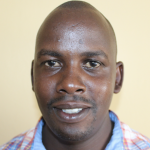July, 2020: COVID-19 Prevention Training Update at Muyundi Community, Baraza Spring
Our teams are working on the frontlines of the COVID-19 pandemic. Join us in our fight against the virus while maintaining access to clean, reliable water.

Trainer Georgina sets up a tippy tap handwashing station
We are carrying out awareness and prevention trainings on the virus in every community we serve. Very often, our teams are the first (and only) to bring news and information of the virus to rural communities like Muyundi, Kenya.

Trainer Shigali leads the 10 steps of handwashing
We trained more than 22 people on the symptoms, transmission routes, and prevention of COVID-19. Due to public gathering concerns, we worked with trusted community leaders to gather a select group of community members who would then relay the information learned to the rest of their family and friends.

Handwashing using the tippy tap
We covered essential hygiene lessons:
- Demonstrations on how to build a simple handwashing station
- Proper handwashing technique
- The importance of using soap and clean water for handwashing
- Cleaning and disinfecting commonly touched surfaces including at the water point.

Homemade mask tutorial
We covered COVID-19-specific guidance in line with national and international standards:
- Information on the symptoms and transmission routes of COVID-19
- What social distancing is and how to practice it
- How to cough into an elbow
- Alternative ways to greet people without handshakes, fist bumps, etc.
- How to make and properly wear a facemask.

Trainer Shigali shows the complete mask made at training
During training, we installed a new handwashing station with soap near the community’s water point, along with a sign with reminders of what we covered.

Trainers install the prevention reminders chart at the spring
Due to the rampant spread of misinformation about COVID-19, we also dedicated time to a question and answer session to help debunk rumors about the disease and provide extra information where needed.

Everyone practices the 10 steps of handwashing
Mr. Peter Baraza, the spring's landowner, reminded community members to remember to read the sack with COVID-19 messages every time they go to fetch water. He also asked everyone to work together and ensure that they improvise and install an additional handwashing station at the spring by the end of that week. He requested everyone to be their brothers’ keeper by ensuring that the COVID-19 preventive measures are observed even at the spring when they go to fetch water.

A community leader addresses the group
We continue to stay in touch with this community as the pandemic progresses. We want to ensure their water point remains functional and their community stays informed about the virus.

Issuing informational pamphlets on COVID-19
Water access, sanitation, and hygiene are at the crux of disease prevention. You can directly support our work on the frontlines of COVID-19 prevention in all of the communities we serve while maintaining their access to safe, clean, and reliable water.

November, 2018: Muyundi Community Project Complete
Muyundi Community is celebrating their new protected spring, so celebrate with them! Baraza Spring has been transformed into a flowing source of water thanks to your donation. The spring is protected from contamination, five sanitation platforms have been provided for the community, and training has been done on sanitation and hygiene.
New Knowledge
We planned for hygiene and sanitation training with assistance from James Baraza. He was constantly in touch with the community members on our behalf. James went house to house passing on information about the venue, date, and time for training.
His work to invite the community yielded 15 participants there waiting for our trainers. The weather on that day was so favorable, with a cloudless sky that allowed the sun to shine brightly. Thus, we held training under the trees at Mr. James Baraza’s homestead.

The training was lively with each and every participant active throughout. Men did seem more interested in women, though. Women were a bit shy asking questions, but they were more informed and talkative when it came to family planning sessions.
We covered several topics including but not limited to leadership and governance (participants started a water and sanitation committee); operation and maintenance of the spring; healthcare; family planning; immunizations; the spread of disease and prevention. We also covered water treatment methods, personal care like handwashing, environmental hygiene, and hygiene promotion. These participants will become ambassadors of healthy living among their own families and their greater community.

Participants walked over to the construction site to learn more about how the spring protection works and how to care for it.
During the environmental hygiene talks, the participants were able to learn how to keep different places clean. They can groom tall bushes around their compounds, drain stagnant water to prevent breeding sites for mosquitoes, keep sanitation facilities clean and discourage open defecation - even for young kids.
The participants realized that environmental hygiene has to involve everyone. If one of the community members does not have a sanitation facility and practices open defecation, the entire community will be prone to diseases because agents of contamination like flies have no boundaries.

"We are humbled and honored to have visitors like you today. Personally, today's training was so powerful and I have learned a lot of things which I didn't know. From today, I hope every participant in this training will have gotten something he or she was missing," said Mr. Mukonyi.
"We are saying indeed, knowledge is power. And through this knowledge, we will conquer any water challenges."
Sanitation Platforms
All five sanitation platforms have been installed and make wonderful, easy to clean latrine floors. These five families are happy about this milestone of having a latrine of their own. We are continuing to encourage families to finish building walls and roofs over their new latrine floors.

Spring Protection
Construction at Baraza Spring was successful and water is now flowing from the discharge pipe.
Selina Charles, age 67, told us how happy she is to have a much safer place to get water. According to her, the stairs down to the water are wonderful for both her and her young grandchildren. Before, they used to worry about slipping and sliding in the mud around the spring.

The Process:
Community members provided all locally available construction materials, e.g bricks, wheelbarrows of clean sand, wheelbarrows of ballast, and gravel. Community members also hosted our artisans for the duration of construction.

The spring area was excavated with jembes, hoes, and spades to create space for setting the foundation of polyethylene, wire mesh, and concrete.

After the base had been set, both wing walls and the headwall were set in place using brickwork. The discharge pipe was fixed low in place through the headwall to direct the water from the reservoir to the drawing area.

As the wing walls and headwall cured, the stairs were set and ceramic tiles were fixed directly below the discharge pipe. This protects the concrete from the erosive force of the falling water and beautifies the spring. The process of plastering the headwall and wing walls on both sides reinforces the brickwork and prevents water from the reservoir from seeping through the walls and allows pressure to build in the collection box to push water up through the discharge pipe.
The source area was filled up with clean stones and sand and covered with a polyethylene membrane to eliminate any potential sources of contamination.
The concrete dried over the course of five days. With this spring now handed over to the community, we will continue to follow up with the water user committee to make sure everything runs smoothly.
"We are so grateful for [you] considering our spring for protection. We had been drinking water from the open water source for so long. Drawing water very early in the morning, to us it was safe for drinking not knowing that contamination can also take place during the night hours," recalled Mr. Baraza.
"But now, the water source is discharging very clean and safe drinking water that can be consumed at any given time."


 Protected Spring
Protected Spring
 Rehabilitation Project
Rehabilitation Project












































